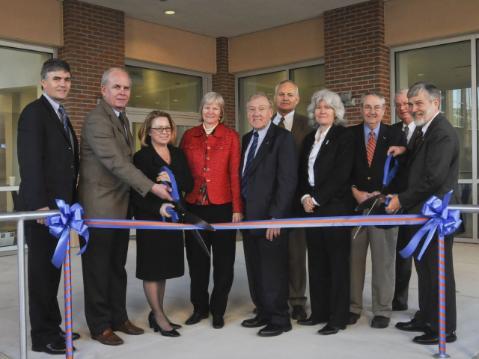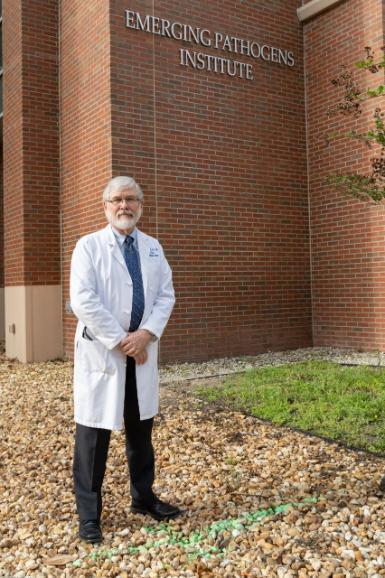UF EPI Director Glenn Morris to step down after 17 years of leadership
J. Glenn Morris, Jr., M.D., M.P.H.T.M., is stepping down from his role as director of the University of Florida’s Emerging Pathogens Institute, a globally recognized powerhouse for infectious disease research.
Morris has helmed the EPI since its founding in 2007. The institute was established with a $60 million grant from the Florida legislature, with the aim of empowering the state to detect, monitor and manage highly dangerous pathogens in Florida and beyond.
As director, Morris, also a professor of infectious diseases, cultivated the EPI’s growth into a world-class, 93,000-square-foot facility, with specialized laboratories for investigating epidemics and bioterrorism. Today, the institute includes more than 250 faculty members, representing 13 UF colleges, who study diseases of people, plants and animals in over 50 countries. EPI members have published more than 5,000 scientific papSers since 2011, producing highly original, interdisciplinary work that has earned the institute a global reputation for excellence.
“Over the past 17 years, Glenn Morris has grown the EPI into exactly the kind of resource we envisioned for Florida, serving as a sentinel against new threats, then responding when they emerge,” said David Norton, Ph.D., UF’s vice president for research. “Never was this more true than during the pandemic, when EPI faculty were on the front lines of developing tests and treatments for the disease. The UF Emerging Pathogens Institute would not be the nationally recognized leader it is today without the visionary leadership of Glenn Morris.”
Expanding the boundaries of infectious disease research

Tasked with a mandate to create the EPI from the ground up, Morris saw an opportunity to establish a research institute focused on interdisciplinary collaboration. He believed that successfully tackling infectious disease outbreaks in a connected world – where any pathogen could be a plane ride away – required breaking down the institutional barriers that kept scientists from joining forces.
Morris envisioned a setting in which veterinarians, clinicians, virologists, data scientists, plant pathologists, physicians, epidemiologists, medical geographers and other disease experts could team up to study, predict and control emerging health threats. This vision informed the EPI’s architectural design. Labs don’t have walls; office doors are glass; and collaborative spaces invite people to work, meet and eat together.
“At many institutes, top scientists labor in individual labs behind locked doors,” Morris said. “My objective from the beginning has been to create a space where teams of researchers from all different fields could look at diseases in multifaceted ways. People at the top of their game are looking to expand their boundaries. The attitude here has always been a collaborative striving for excellence.”
Honing this research strategy has been his proudest achievement as EPI director, Morris said: “To my knowledge, there are not any other institutes in the U.S. that place such a high priority on an interdisciplinary, team-based approach to studying disease.”
EPI member and Morris’s longtime collaborator John Lednicky, Ph.D., said Morris excels at pinpointing people’s strengths and assembling the right combination of expertise. Lednicky, a professor in the UF College of Public Health and Health Professions, credits his identification of the Zika virus in Haiti to Morris’s foresight in convening a team to study mosquito-borne diseases after mothers and nurses reported widespread fevers and rashes, which were initially thought to be routine malaria or chikungunya. The discovery preceded the Zika outbreak in Brazil that triggered international headlines. Primacy – the distinction of being first – has become a hallmark of EPI research, Lednicky said.
“We were in the right place at the right time,” he said. “The fact that the EPI is so well recognized internationally and that people are able to work together so collaboratively are a tribute to the spirit Glenn brought. People from other universities and government agencies across the U.S. look to the EPI to learn how they can improve the management of their own facilities.”
In another example of the EPI being ahead of the curve, researchers isolated the SARS-CoV-2 virus from a UF doorknob before any COVID-19 cases had been identified in Florida. Under Morris’s direction, EPI members readied a diagnostic test for COVID-19 before the state recorded its first case and, in a matter of days, prepped an EPI lab to run more than 1,000 tests a week.
Gregory Gray, M.D., an EPI member from 2010-2014, described Morris as “a model leader.”
“He inspired scientists to ambitiously try new research approaches,” said Gray, now a professor in infectious disease epidemiology at the University of Texas Medical Branch.
Morris also ensured researchers studying animal and plant diseases did not get short shrift. One of the EPI’s more unusual facilities is the Aquatic Pathobiology Laboratory, where scientists investigate infectious diseases of fish, sea turtles, marine mammals and other animals.
“Dr. Morris never lost sight of the mission of the EPI to investigate the emergence of human, animal and plant pathogens and the unique set of funding needed for non-human research,” said Maureen Long, D.V.M., Ph.D., the EPI’s associate director for research resources and professor emeritus in the UF College of Veterinary Medicine. “He provided space, equipment and outreach resources to those of us in the plant, animal and arthropod community over the years.”
An early exposure to tropical disease spurs a lifelong vocation
 The son of missionaries, Morris spent most of his youth in Thailand, where he witnessed firsthand the devastation of tropical illnesses, including a cholera outbreak that crippled the city of Bangkok. His early years instilled a lifelong interest in science and public health – and in asking the right questions.
The son of missionaries, Morris spent most of his youth in Thailand, where he witnessed firsthand the devastation of tropical illnesses, including a cholera outbreak that crippled the city of Bangkok. His early years instilled a lifelong interest in science and public health – and in asking the right questions.
“Public health is based on a scientific understanding of why diseases occur, why they emerge and how they can be best controlled,” Morris said. “Those have been the guiding questions throughout my career.”
After earning dual undergraduate degrees in biology and medieval Chinese history, he attended medical school at Tulane University, adding a master’s degree in tropical medicine and public health. Upon completing his residency, Morris joined the Centers for Disease Control and Prevention as an epidemic intelligence service officer, a first responder to crises, outbreaks and emergencies. It was a role that trained him to marshal disease expertise and resources quickly.
The study of cholera and other water- and food-borne illnesses became a cornerstone of Morris’s scientific research, but his publication portfolio provides evidence of a questing mind. His investigations have tracked across the changing landscape of emerging global pathogens and include research on waterborne toxins, arboviruses, sepsis, behavioral toxins, COVID-19 and the therapeutic use of bacteria-destroying viruses known as phages.
Morris arrived at UF, having previously served as the chairman of the department of epidemiology and preventive medicine and interim dean at the University of Maryland, Baltimore, School of Public Health.
Confronting an epidemic of misinformation
Over the last few years, however, Morris has contended with a new and unexpected threat to public health: a growing mistrust in science and scientists and the rampant spread of misinformation. He is increasingly troubled by how these challenges may reshape the use and utility of science in the future, including in Florida.
“The greatest risk right now is at the level of misinformation and mistrust of science,” Morris said. “My life has been committed to do the best science – to do the most good for the most people. It’s tough to hear people say, ‘We don’t believe you.’”
Concentrating purely on infectious disease research may no longer be enough to help safeguard against and respond to public health threats, Morris said. Sound science must be paired with effective communication.
“There needs to be a much greater focus on trying to help people understand science and the method and motivations behind it in order to rebuild some of the trust that has been lost over the past five years,” he said.
For Morris, directing the EPI is the capstone to a career in public health and pathogen-related fields that spans 45 years. While he is relinquishing his administrative duties, Morris is not retiring. On Nov. 8, he will return to focusing on his epidemiological research. He will also continue to serve as director of the National Institute for Occupational Safety and Health’s Southeastern Coastal Center for Agricultural Health and Safety, a grant-funded center that grew out of a team Morris organized to respond to toxins in the wake of the Deepwater Horizon oil spill of 2010.
“I’m going to get to do what I enjoy the most – do the research and try to understand what’s going on with specific diseases.”
Marco Salemi, Ph.D., EPI’s associate director for research initiatives and a professor and Stephany W. Holloway University Chair in AIDS Research in the College of Medicine, will serve as interim director.

